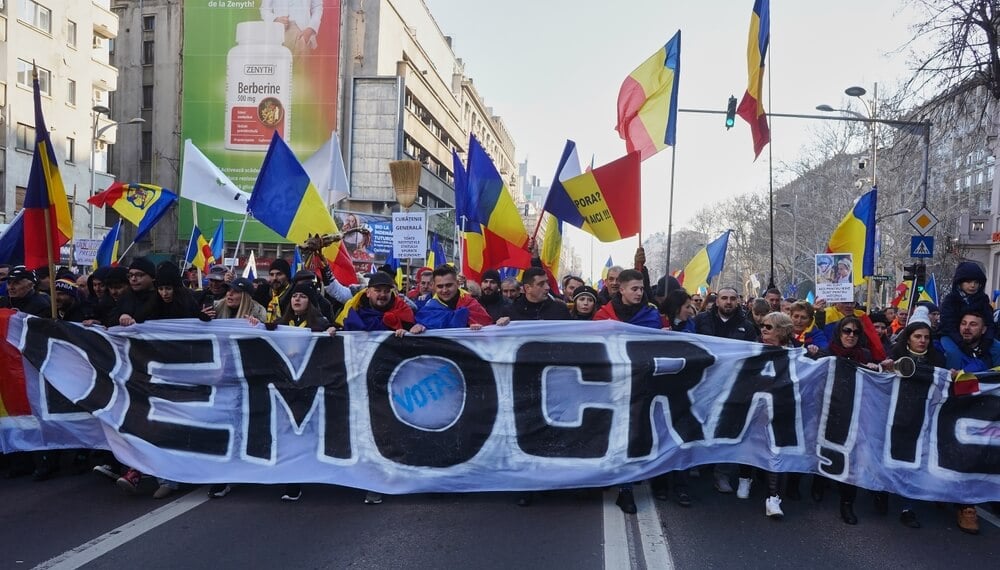The presidential election in Romania turned from a relatively harmless political crisis in Europe into a trigger for a rift in European-American relations in February when US Vice President JD Vance cited it as an example of growing "totalitarianism" in Europe.
"If your democracy can be destroyed with a few $100,000 of digital advertising from a foreign country, then it wasn't very strong to begin with," said JD Vance at the Munich Security Conference, in a speech that sounded the alarm to Europeans that they could no longer count on Washington's full support.
The US vice president then referred to the cancellation of the first round of the presidential election in Romania last November after state authorities found that its winner, Călin Georgescu, had crucial financial and media support from Russian intelligence.
Mr Georgescu will not run in the elections in two weeks, as the Constitutional Court banned participation due to numerous malversations supported by Russia.
But on the eve of the first round of elections on 4 May, a large shadow of Russian interference and the country's slide into pro-Russian, far-right populism hangs over Romanians and their young democracy.
Georgescu is gone, but not his politics
George Simion, the leader of the right-wing Alliance for the Union of Romanians (AUR), has by far the best prospects ahead of the elections. He has about 30% of the support ahead of the elections, which represents the sum of the votes he won in the last November elections plus the votes of voters who voted for the now-suspended Georgescu.
Therefore, Mr Simion has taken over the electorate of the disqualified Georgescu, and that forms the backbone of his hopes for electoral success.
For Romania, this means that by disqualifying the pro-Russian Georgescu, its institutions have removed the risk of direct Russian influence on the electoral process, but also a very convincing number of voters left who support the policies he advocated.
Simion's AUR party is one of the moderate Eurosceptics at the EU level
Simion's AUR party is one of the moderate Eurosceptics at the EU level. It is a member of the European Conservatives and Reformists bloc in the European Parliament, which includes 80 MEPs from 19 EU member states. This bloc includes, for example, Prime Minister Giorgia Meloni’s Brothers of Italy and the Polish Law and Justice party of President Andrzej Duda.
Mr Simion's candidacy might be acceptable to many Romanians with a strong sense of nationalism, but not to the extent that they want a confrontation with the EU.
Undesirable in Ukraine and Moldova
Simion and his party reject extensive support for Ukraine; they have criticised the government for supplying arms to Kyiv and supported a blockade of agricultural imports from Ukraine to protect domestic producers.
Kyiv does not trust this politician; moreover, last November it banned him from entering Ukraine due to, as explained, "systematic anti-Ukrainian activities by this politician, which contravene Ukraine’s national interests and violate state sovereignty and territorial integrity."
Both Ukraine and Moldova believe that the favourite in the Romanian presidential elections is strongly pro-Russian
In addition, Simion was banned from entering neighbouring Moldova in 2015, and the country's pro-European government extended this ban for a further five years in early 2024.
Both Ukraine, which has suffered Russian aggression for three years, and Moldova, which continues to suffer under Moscow's pressure due to its pro-European orientation, believe that this favourite in the Romanian presidential elections is strongly pro-Russian.
However, this does not diminish his chances on the domestic political stage, as he tries to maintain milder rhetoric with regard to Ukraine, Russia, and the EU than the disqualified Georgescu, but under that public facade, he practically advocates an identical policy.
Trump's ally in Europe
Mr Simion's candidacy is gaining strength, particularly after Donald Trump took office, and should be seen in this context as an attempt by Romania to get a president who reflects Washington's new policy towards Europe.
The somewhat unexpected mention of Romania by US Vice President JD Vance as an example that America does not want to see in its European allies undoubtedly provided a strong tailwind for Mr Simion's policy.
 The Romanian right-wingers want to position themselves as direct allies of the new American administration in Europe
The Romanian right-wingers want to position themselves as direct allies of the new American administration in Europe
From this moment on, the Romanian right-wingers want to position themselves as direct allies of the new American administration in Europe, against the tendencies to strengthen European sovereignty regarding the US, which are represented by the so-called "old members" of the EU, France in particular.
George Simion's goal is to win the presidential election and join a group of European leaders, including Hungarian Prime Minister Viktor Orbán, Slovakian Prime Minister Robert Fico and, to a certain extent, Italian Prime Minister Meloni, who will prioritise the alliance with the US over advocating greater European autonomy.
As an important NATO member state, Romania will face a major test and play a major role in the forthcoming elections in the context of strengthening the Alliance on its eastern flank and in the strategically significant Black Sea region.
The Eurosceptic Simion's almost certain participation in the second round of the election will test the strength of the pro-European mainstream candidates and their ability to mobilise their electorate to respond to the "threat" from the far right.
In the run-up to the first round on 4 May, they have not demonstrated their ability to reach a mutual compromise. As a result, they will present several candidates, each of whom trails behind Mr Simion by a double-digit margin.